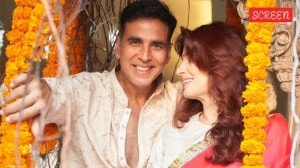Sex, it is a-changing
Two newsmagazines this week chose to focus on the changing sexuality of the urban Indian woman. India Today claimed that single Indian women...

Two newsmagazines this week chose to focus on the changing sexuality of the urban Indian woman. India Today claimed that single Indian women are “shaking off years of conservatism and asserting their sexuality with growing confidence” while the point of the Outlook story was made clear by its blunt title: ‘Women Buy Men For Sex’.
For India Today it was a revisit of a 2003 story on the ‘Intimate Desires Of the Indian Woman’, a story it had illustrated with a picture of a bare-shouldered Caucasian woman lolling seductively on a bed. Commenting on the decision to use a foreigner to represent Indian women, this columnist had wondered if it had been dictated by a concern that male readers may have found the sight of a sultry Indian woman seething with “intimate desires” too up close and threatening for comfort. In the current issue of the magazine, however, pictures of Indian woman have been freely used leading one, by the same logic, to speculate that regardless of women changing, Indian men are perhaps more at ease with female sexuality.
The Outlook story goes one step further by claiming they (men) are not just at ease with female sexuality but are even making money out of it. The stars of this story are not really women, the shadowy married “aunties” who buy sex but the strutting twenty-somethings who provide it. Sohail, Rohit, Mike, with their gelled hair and seductive lines, are the contemporary male version of the female prostitute.
Indeed, so much has been written recently about the revolution in women’s sexual attitudes that it is time now perhaps, to turn the scanner on men. And the way they are coping with the socio-cultural changes of our times. Or not. Cultural anthropologist Shiv Viswanathan analysing the findings of the India Today survey writes that while the fact that men and women feel a mutual pleasure in sex is significant it is, in some ways, a deceptive shift. The contemporary male mind, according to him, still stuck in professionalism and patriarchy, is like a “still life piece” in a world where women are increasingly experimenting.
Susan Faludi, in her study on American men, Stiffed, wrote that the nineties man was the equivalent of the fifties housewife. Her incessant shopping had become his “consumerism”. Her need to exaggerate her femininity with make up was like his urge to display manliness with gym-toned muscle. “No wonder” Faludi wrote, “men are in such agony, not only are they losing the society they were once essential to, they are ‘gaining’ the very world women so recently shucked off as demeaning and dehumanizing.” The consequences are not hard to see. A study reported last month by the consumer research company, Mintel, revealed that one in seven British men were anxiety ridden, particularly about the deficit between aspiration to “have it all” and the reality. While the Outlook story found, beneath the swagger of the gigolo, “sharp pangs of self doubt”.
Will the man evolve to keep pace with the woman? The question can be a bit baffling when one considers that women can be equally caught up in attitudes once considered the preserve of the male. Over the last few months for instance, we have seen a series of high profile cases in which women were suspected of involvement in kidnapping, gambling and attempted murder. And this at a time when fashion designers are urging men to wear softer colours. And advertisers beaming sentimental commercials about fathers and children.
Fads about what is considered attractive in men to women change swiftly, from metro to retro to ubersexual. The press carries articles about couples where the traditional roles are reversed: where wives earn more than husbands and men choose to play homemaker. But they also tell us about surveys in which female college toppers in a western university are looking forward to a future as stay-at-home moms.
Then there are trends such as older, successful women dating younger men and the growing acknowledgement and the legalisation of homosexual unions. And the issues all these changes raise about our traditional social norms and laws. Bruce Willis and Bob Geldof on a recent TV chat show claimed, for instance, it was unfair for divorced fathers to have to give up their kids.
In the circumstances, Shahrukh Khan’s recent plunge, hairless chest and all, into a rose petal filled bath, can be read as a vivid acknowledgement of the grey, mine-filled area we are entering. We are shedding our traditional means of gender identification, the image seems to say, and entering uncharted waters. The bath could be a place of play, ritual seduction a la the Lolitaesque fantasy in American Beauty or Ophelia’s grave. It is a time to watch one’s step.



- 01
- 02
- 03
- 04
- 05




























